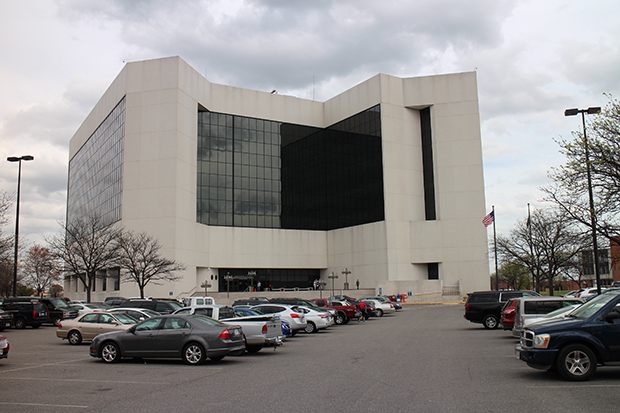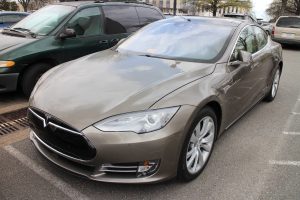With a gallery of at-times vocal supporters behind it, Tesla’s goal at the hearing was to persuade the Virginia Department of Motor Vehicles that it meets the exception to a state code that says manufacturers can only open storefronts in the state if no independent seller is available to run a dealership in a way consistent with the public interest.
Tesla lawyers argued that its low-profit business model makes it impossible for an independent dealership to sell Teslas in a viable way.
“They cannot operate in the public interest,” George Riley, a Tesla lawyer, said of independent auto dealers, which typically make money off markups, parts, service and financing.
That argument didn’t fly with the VADA, a franchised new car and truck dealer advocacy group. It argued that Tesla was trying to circumvent Virginia law and that plenty of independent dealers would gladly sell Teslas in a way that serves the public interest.
“Tesla wants to create something that doesn’t exist,” said Brad Weiss, VADA’s lawyer, of Tesla’s efforts to sell cars in Richmond. “If that’s what they want, they should go to the state legislature.”
Tesla opened a Virginia showroom and dealership within the last two years in Tysons Corner, only after reaching an agreement with VADA and the DMV.
But Tesla’s recent attempts to open a Richmond dealership prompted a lawsuit this month filed by the VADA, which contended that the DMV and Tesla violated the agreement that let the car company open its initial Virginia store.VADA argued that Tesla doesn’t want to adhere to the same rules as other Virginia companies.
“Numerous dealers from around Virginia contacted Tesla asking about the opportunity to sell Teslas,” Donald Hall, VADA president and CEO, said in a statement. “Three Richmond-area auto dealers with experience in selling electric vehicles came to the hearing today to say they’re ready to discuss a Tesla franchise.”
Held on the seventh floor of the DMV building at 2300 W. Broad St., the hearing began at 9 a.m. and didn’t wrap up until late in the afternoon, after several contentious periods.
To help make its case, Tesla relied on testimony from Diarmud O’Connell, a Tesla vice president of business development; Herb Walter, an analyst of the retail auto industry; and Fiona M. Scott Morton, a Yale economics professor.
Weiss described Tesla’s arguments and presentation as “a dog and pony show.” His extensive cross examination of O’Connell caused dismay in Tesla’s lawyers.
“This is obscene,” Riley said. “We have never been treated this way.”
The two sides argued their case to DMV hearing officer Daniel Small, who will now go to DMV commissioner Richard Holcomb to determine whether Tesla should be allowed to set up a dealership in Richmond. A final decision could take months to be decided. Because not all of the testimony could be heard yesterday, another hearing has been set for April 25, according to Brandy Brubaker, a DMV spokesperson.
There’s no word on where Tesla might open its Richmond dealership if it gets the DMV’s blessing. The company did not respond to an inquiry by press time.
Founded in 2003 and led by CEO Elon Musk, Tesla’s cars are battery-powered and charged using an outlet. The company touts its “revolutionary” business model that replaces haggling and upselling with consistent pricing across stores and online.
It made 50,000 cars last year at its factory in Fremont, California. The company has stores and showrooms, or “galleries” in Tesla’s parlance, in North America, Europe, Asia and Australia.
The company yesterday began taking orders for its Model 3 mass market car, with orders starting at $35,000.
David Unk, a Tesla Model S owner, attended the hearing. He said he thinks letting the car manufacturer operate in Richmond would mean more jobs and investment in the area.
“We want this business here in the Commonwealth,” he said. “It’s all about the money – bringing money for Virginia. I just don’t want the Commonwealth to be behind North Carolina and Maryland.”
Lawyers for electric car maker Tesla squared off with the Virginia Automobile Dealers Association on Thursday over whether the Palo Alto, California-based company should be allowed to open a dealership in Richmond.
With a gallery of at-times vocal supporters behind it, Tesla’s goal at the hearing was to persuade the Virginia Department of Motor Vehicles that it meets the exception to a state code that says manufacturers can only open storefronts in the state if no independent seller is available to run a dealership in a way consistent with the public interest.
Tesla lawyers argued that its low-profit business model makes it impossible for an independent dealership to sell Teslas in a viable way.
“They cannot operate in the public interest,” George Riley, a Tesla lawyer, said of independent auto dealers, which typically make money off markups, parts, service and financing.
That argument didn’t fly with the VADA, a franchised new car and truck dealer advocacy group. It argued that Tesla was trying to circumvent Virginia law and that plenty of independent dealers would gladly sell Teslas in a way that serves the public interest.
“Tesla wants to create something that doesn’t exist,” said Brad Weiss, VADA’s lawyer, of Tesla’s efforts to sell cars in Richmond. “If that’s what they want, they should go to the state legislature.”
Tesla opened a Virginia showroom and dealership within the last two years in Tysons Corner, only after reaching an agreement with VADA and the DMV.
But Tesla’s recent attempts to open a Richmond dealership prompted a lawsuit this month filed by the VADA, which contended that the DMV and Tesla violated the agreement that let the car company open its initial Virginia store.VADA argued that Tesla doesn’t want to adhere to the same rules as other Virginia companies.
“Numerous dealers from around Virginia contacted Tesla asking about the opportunity to sell Teslas,” Donald Hall, VADA president and CEO, said in a statement. “Three Richmond-area auto dealers with experience in selling electric vehicles came to the hearing today to say they’re ready to discuss a Tesla franchise.”
Held on the seventh floor of the DMV building at 2300 W. Broad St., the hearing began at 9 a.m. and didn’t wrap up until late in the afternoon, after several contentious periods.
To help make its case, Tesla relied on testimony from Diarmud O’Connell, a Tesla vice president of business development; Herb Walter, an analyst of the retail auto industry; and Fiona M. Scott Morton, a Yale economics professor.
Weiss described Tesla’s arguments and presentation as “a dog and pony show.” His extensive cross examination of O’Connell caused dismay in Tesla’s lawyers.
“This is obscene,” Riley said. “We have never been treated this way.”
The two sides argued their case to DMV hearing officer Daniel Small, who will now go to DMV commissioner Richard Holcomb to determine whether Tesla should be allowed to set up a dealership in Richmond. A final decision could take months to be decided. Because not all of the testimony could be heard yesterday, another hearing has been set for April 25, according to Brandy Brubaker, a DMV spokesperson.
There’s no word on where Tesla might open its Richmond dealership if it gets the DMV’s blessing. The company did not respond to an inquiry by press time.
Founded in 2003 and led by CEO Elon Musk, Tesla’s cars are battery-powered and charged using an outlet. The company touts its “revolutionary” business model that replaces haggling and upselling with consistent pricing across stores and online.
It made 50,000 cars last year at its factory in Fremont, California. The company has stores and showrooms, or “galleries” in Tesla’s parlance, in North America, Europe, Asia and Australia.
The company yesterday began taking orders for its Model 3 mass market car, with orders starting at $35,000.
David Unk, a Tesla Model S owner, attended the hearing. He said he thinks letting the car manufacturer operate in Richmond would mean more jobs and investment in the area.
“We want this business here in the Commonwealth,” he said. “It’s all about the money – bringing money for Virginia. I just don’t want the Commonwealth to be behind North Carolina and Maryland.”


So what benfit to society does VADA bring? To me it appears to be a legalized middle man. I just dont understand why they even exist?
Glad that the public is learning about the many non-competitive, protectionist policies enacted by the state of Virginia that stifle investment and growth. Beer distributors are another category that need to be analyzed.
Right. Here’s hoping that the Washington Post and rest of Virginia’s media catch up with Richmond BizSense on this story. Great job of reporting here. While this is business news, the general media needs to explain what this means to the consumer in terms of being able to buy a Tesla.
That is the question, and the only question, in front of DMV.
Totally agree.
“Tesla wants to create something that doesn’t exist” – Precisely.
Tesla would be creating something that doesn’t exist. We have purchased a fully electric car from a local dealer. Buying it and owning it was a terrible experience, the dealership was completely inept and the product was sub par. Tesla is a world apart from what any other business entity here can offer. They deserve to have a presence in Richmond and the citizens of the Commonwealth more than deserve Tesla being “allowed” to set up shop.
I am just thankful that my children, through taxes and borrowing, are allowed to help rich boys pay for these expensive sports cars.
The US taxpayers have borrowed $1.5 BILLION to help rich greens buy environmental absolution… and amazing performance.
Nothing compared to the trillions of tax $ they’ve spent subsidizing the fossil fuel industry, so your point is invalid.
Please point out these fossil fuel subsidies. There are tax deductions, like the deprecation allowance on oil wells, but then these same deductions are allowed for oh-so-green geothermal wells.
Tesla buyers receive tax credits paid for with borrowed money our children will repay. Does the government borrow money to help me buy a gasoline powered sports car? Do they send checks of OTHER people’s money to Exxon? NO
Tesla receives money taken from other auto companies by the state of California and given to Tesla. Do oil companies receive payments mandated from other companies? NO
For what reason does this law exist? No one has yet to explain why it’s anything other than a handout to a special interest (car dealers) at the expense of consumers.
Here’s a way to ensure that Tesla doesn’t get to play by a different set of rules than the car dealers — RESCIND THE LAW! (Of course car dealers wouldn’t actually support this even though they are arguing that they deserve a level playing field….)